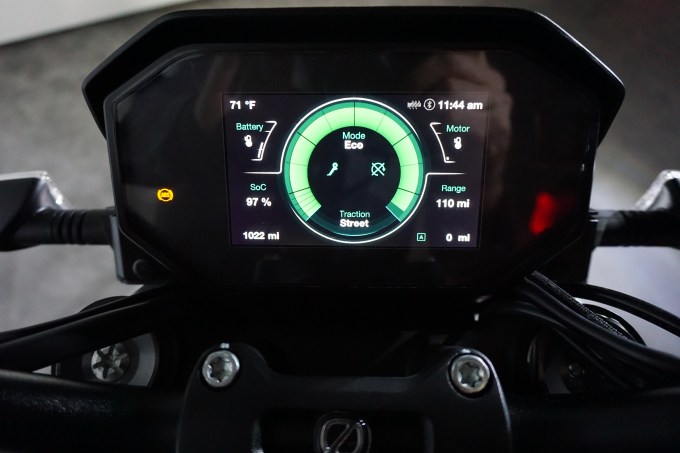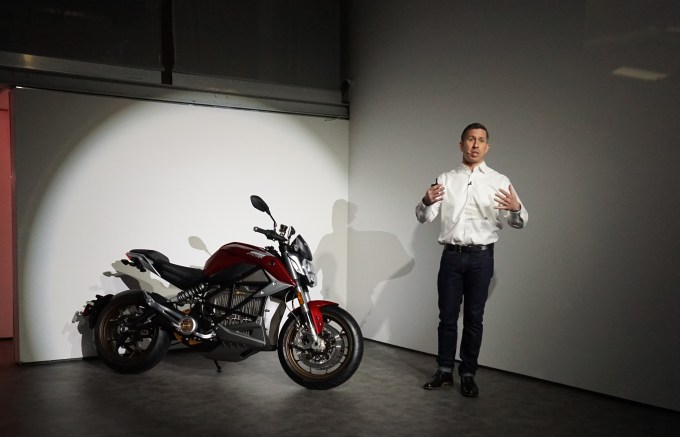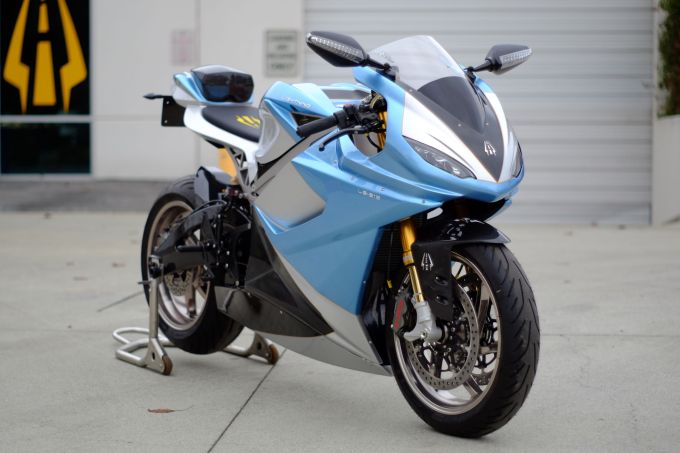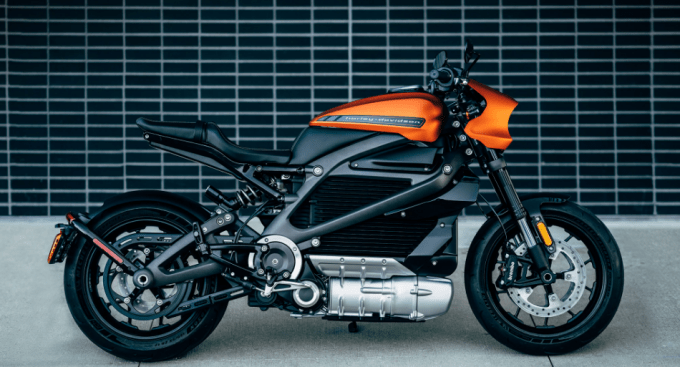As the mobility world awaits Harley Davidson’s EV debut, there’s plenty of motion in the e-moto startup space.
Zero Motorcycles unveiled its new 110 horsepower SR/F model in New York this week, offering a 200 mile range, one hour charge capability, and top speed of 124 mph.
The California based startup—whose investors include New York VC firm Invus—wired the SR/F with Zero’s new Cypher III operating system and Bosch’s Motorcycle Stability Control.
 Both combine to offer remotely synced mobile connectivity to the motorcycle’s charge status and performance controls. The 485 pound SR/F is upgraded from Zero’s existing line-up to include cornering ABS, traction control, and a new app and dash interface.
Both combine to offer remotely synced mobile connectivity to the motorcycle’s charge status and performance controls. The 485 pound SR/F is upgraded from Zero’s existing line-up to include cornering ABS, traction control, and a new app and dash interface.
Zero’s two-wheeler comes in at an entry price of $18,995. On the business side, the EV startup could produce as many as 10,000 SR/Fs and add members to its 200 dealer network, CEO Sam Paschel told TechCrunch in New York.
 Zero’s SR/F enters the e-moto market in a year where EV startups will face more competition on specs and pricing, and big motorcycle manufacturers will feel more pressure to go electric.
Zero’s SR/F enters the e-moto market in a year where EV startups will face more competition on specs and pricing, and big motorcycle manufacturers will feel more pressure to go electric.
From a business perspective, as TechCrunch has reported, the U.S. motorcycle industry has been in pretty bad shape since the recession. New sales dropped by roughly 50 percent since 2008, with sharp declines in ownership by everyone under 40. The exception is women, who have become the only growing motorcycle ownership segment.
E-moto upstarts have worked to attract new riders and close gaps with gas motorcycles in performance and cost—but most offerings have come with some compromise.
Italian company Energica’s models hit high marks in tech controls and performance—with 150 horsepower, 30 minute fast-charge times, and 125 mile range—but not without a hefty price of $20K and up.
Lightning Motorcycles, another California based e-moto startup, offers ultra-high end of performance, claiming the world’s fastest production motorcycle in the world with its LS-218. But the $38K, 218 mph, track bred e-moto isn’t exactly average rider accessible. 
Zero Motorcycles has found the widest market and model breadth, with prices starting at $8K on its FX model. Still, Zero’s e-motos (including the $16K SR) haven’t matched the performance control options, specs, or charge-times of the higher priced Energica Ego or Eva.
In 2019, Zero’s new machine—and a model being teased by Lightning—could bridge gaps in performance, range, charge-times, and price that have held many back from going e-motorcycle.
With its Bosch MSC system and upgraded operating system, the fully redesigned SR/F matches Energica in digital performance controls and comes close on power and speed at a more competitive price.
As TechCrunch reported, Lightning began taking reservations for a $12,998 Strike e-moto with some almost unbelievable stats at that price: 150 mph top speed, 35 minute charge-time, and 150 mile range. Lighting calls it their “first premium mass-market motorcycle,” with plans to unveil sometime in March.
Both Zero and Lightning’s 2019 models are positioned to compete with Harley Davidson’s EV entry, the $29K LiveWire expected to debut sometime this summer. HD revealed more product specs recently, such as 3 second 0-60 mph acceleration and 110 mile range. Harley Davidson has also indicated it plans a full pivot to electric, with additional e-motorcycles in the pipeline, as well as e-bicycles and scooters.
Harley’s electric moves, as well as Zero and Lightning’s more competitive offerings, could hasten major motorcycle manufacturers’ plans to sell e-motos. None of the big names producers—Honda, Kawasaki, Suzuki, BMW—have offered a production electric street motorcycle in the U.S. HD will be the first.

With momentum in the motorcycle world shifting electric, there are more than a few caveats as to whether there’s a viable U.S. market. In addition to the contracting sales environment, the e-moto startup space has racked up a series of failures. These include Brammo, Mission Motorcycles, and more recently, Alta Motors—a California based EV venture backed by $45 million in VC that ceased operations in October. Alta had a partnership with Harley Davidson (now defunct) and there’s been little light shed on what forced them to shut off the lights.
Alta Motors resurfaced last week, when Canadian company BRP—the owner of such brands as snowmobile maker Ski-Doo and watercraft producer Sea-Doo—acquired select Assets of Alta. There had been hopes someone would purchase and revive the California e-moto startup, but that looks unlikely. “We don’t have any current plans for resuscitating Alta Motors in it’s old form,” BRP’s Vice President for Communications Leslie Quinton told TechCrunch. “We have no plans yet to announce how we’re going to use the technologies,” she said.
So as Harley Davidson, Zero, and Lightning move to mainstream electric motorcycles in 2019, it appears another e-moto startup has officially faded into history.
Comments
Post a Comment